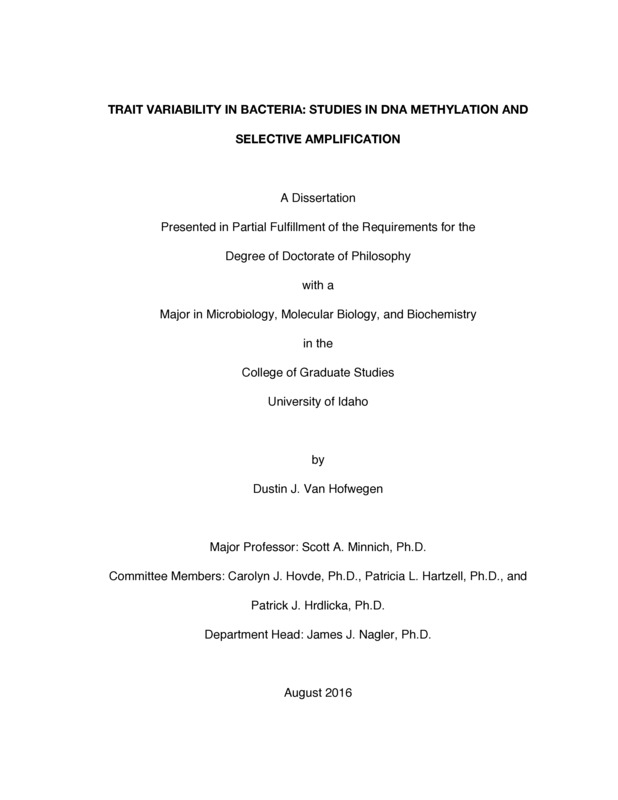Trait Variability in Bacteria: Studies in DNA Methylation and Selective Amplification
Van Hofwegen, Dustin James. (2016). Trait Variability in Bacteria: Studies in DNA Methylation and Selective Amplification. Theses and Dissertations Collection, University of Idaho Library Digital Collections. https://www.lib.uidaho.edu/digital/etd/items/vanhofwegen_idaho_0089e_11004.html
- Title:
- Trait Variability in Bacteria: Studies in DNA Methylation and Selective Amplification
- Author:
- Van Hofwegen, Dustin James
- Date:
- 2016
- Keywords:
- Citrate DNA Methylation Evolution Yersinia
- Program:
- Biology
- Subject Category:
- Microbiology; Genetics; Molecular biology
- Abstract:
-
Eubacteria recognize environmental cues to vary gene expression. The mechanisms used are often determined by modifications to their DNA, including variations to the linear sequence and structure, and epigenetic modifications. Using two bacterial model systems, Escherichia coli and pathogenic Yersinia enterocolitica, we investigated two modification mechanisms— selective amplification and epigenetic DNA methylation.
Y. enterocolitica respond when encountering a shift to host temperature by immediately repressing motility and activating plasmid-encoded virulence operons. In contrast, shifting from host to ambient temperature requires 2.5 generations to restore motility suggesting a link to the cell cycle. We hypothesized that differential DNA methylation contributes to temperature-regulated gene expression. We tested this hypothesis by comparing single-molecule real-time (SMRT) sequencing of Y. enterocolitica DNA from cells growing exponentially at 22°C and 37°C. Among the 27,118 DNA adenine methylase (Dam) sites, we identified 42 had differential methylation patterns while 17 remained unmethylated regardless of temperature. A subset of the differentially methylated Dam sites localized to promoter regions of predicted regulatory genes including LysR-type and PadR-like transcriptional regulators, and a cyclic-di-GMP phosphodiesterase. Identification of these differences in methylation provide likely candidates for regulators responsible for temperature-dependent phenotypes.
In E. coli, the isolation of an aerobic citrate-utilizing (Cit+) strain in long-term evolution experiments (LTEE) has been termed a rare, innovative, presumptive speciation event. We hypothesized that direct selection would rapidly produce the selective amplification events necessary to yield the same class of E. coli Cit+ mutants. Using similar media, 46 independent citrate-utilizing mutants were isolated in as few as 12 to 100 generations. Genomic DNA sequencing revealed an amplification of the citT and dctA loci and DNA rearrangements to capture a promoter to express CitT, aerobically. These are members of the same class of mutations identified by the LTEE. We conclude that the rarity of the LTEE mutant was an artifact of the experimental conditions and not a unique evolutionary event. No new genetic information (novel gene function) evolved.
These two systems show how bacteria respond to adverse environmental conditions— the host immune system (Yersinia) and starvation (E. coli).
- Description:
- doctoral, Ph.D., Biology -- University of Idaho - College of Graduate Studies, 2016
- Major Professor:
- Minnich, Scott A
- Committee:
- Hovde-Bohach, Carolyn J; Hartzell, Patricia L; Hrdlicka, Patrick J
- Defense Date:
- 2016
- Identifier:
- VanHofwegen_idaho_0089E_11004
- Type:
- Text
- Format Original:
- Format:
- application/pdf
- Rights:
- In Copyright - Educational Use Permitted. For more information, please contact University of Idaho Library Special Collections and Archives Department at libspec@uidaho.edu.
- Standardized Rights:
- http://rightsstatements.org/vocab/InC-EDU/1.0/

